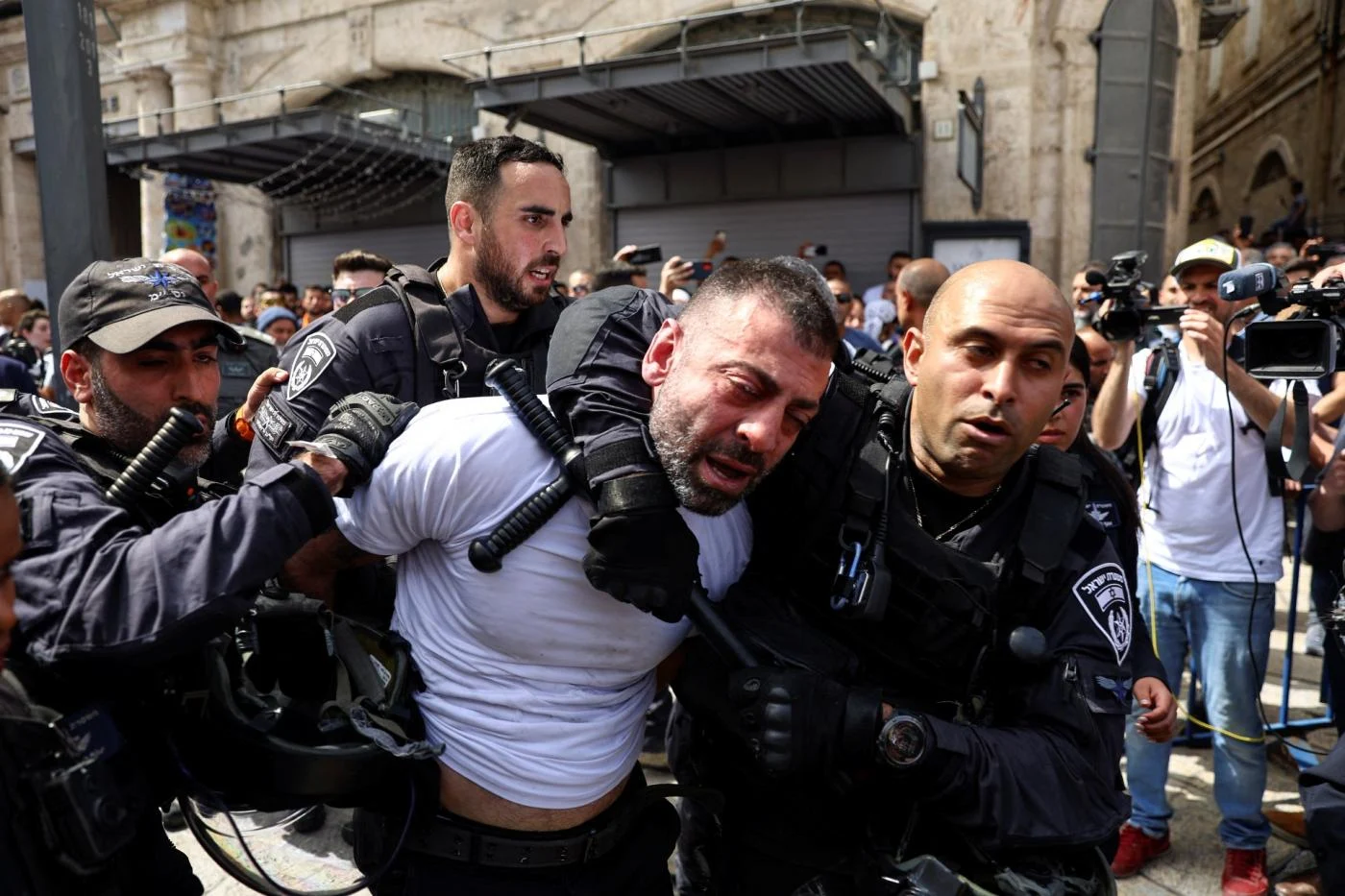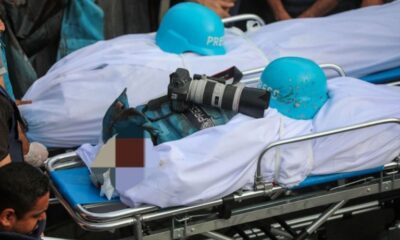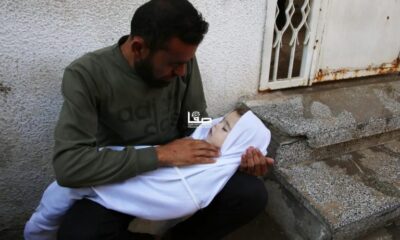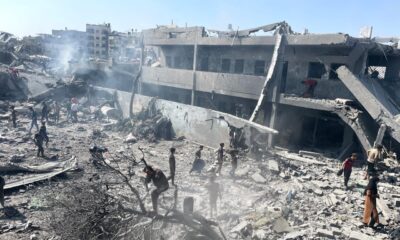Breaking News
Shireen Abu Akleh Strong but insecure, ‘Israel’ can no longer leave the dead in dignity

In June 2001, Faisal al-Husseini, at the time the Palestinian Authority’s (PA) minister for Jerusalem affairs and a senior PLO official, was laid to rest. The funeral procession began at the Muqata’a in Ramallah, and made its way via the Qalandia checkpoint to the al-Aqsa Mosque for burial.
The coffin was draped with a Palestinian flag, and Palestinian flags waved along the route of his final journey through the streets of occupied East Jerusalem and over his final resting place at al-Aqsa.
Those were the days of the Second Intifada, when the Palestinian flag represented an organisation, the PLO, determined to establish a Palestinian state in the West Bank, the Gaza Strip and East Jerusalem, as quickly as possible.
The Israel of 2001 coped all right with Palestinian flags. So how is it that today – when waving a Palestinian flag is predominantly about identity, the emergence of a Palestinian state any time soon is highly unlikely, and the security threats, however serious, are much less daunting than during the bloody days of the Second Intifada – the Israeli police find it necessary to send a heavily armed force to tear away the Palestinian flag draping the coffin of journalist Shireen Abu Akleh, while violently assaulting the bereaved who accompanied the coffin until the pallbearers very nearly dropped it?
Why was it that in 2001 Israel felt secure when confronting Palestinian flags waving above the streets of its “eternal capital” during the funeral procession of a senior Palestinian political figure, but in 2022 a flag draped in mourning over a journalist’s coffin was deemed a threat to Israel’s existence?
Before attempting to answer that question, it is worth pausing briefly to consider the police riot against Abu Akleh’s pallbearers and the images of violence surely destined to linger long in the media and the memory.
They were scenes that nauseated not only the millions of Palestinians watching the procession live, and the hundreds of millions of Arabs and others around the world who were also looking on, but also more than a few Jewish Israelis, many of them not radical leftists.
An ancient taboo
The taboo against dishonouring the dead and the obligation to ensure a dignified disposition of the deceased’s body are among the most ancient of human customs. Even in wartime, the dead are set apart.
Sophocles, in Antigone, tells of the tragic consequences when the king of Thebes refuses to allow a burial for Antigone’s brother Polyneices, who died after taking up arms against the man who had usurped his throne.
Judaism, too, makes this process sacrosanct. In the tractate on “blessings” in the Mishnah, it is said that pallbearers “and their alternates, and the alternates’ alternates” are exempt from reciting the Shema, wearing phylacteries, “and all the other commandments in the Torah” that might interfere with their pallbearing duties.
The obligation to allow burial of one’s fallen enemies is part of every international convention on the laws of war. A society that shirks its responsibility to honour the dead, its own or its enemy’s, is renouncing a fundamental tenet shared by all humans and is relinquishing its own humanity.
The Israeli-Palestinian/Israeli-Arab conflict has its own instances of dishonouring the dead. Both sides are guilty of it: the mutilation of the casualties from the Convoy of the 35 in 1948, the cremation of corpses of villagers at Deir Yassin, and others. But what happened last Friday, when the funeral procession left the French Hospital in East Jerusalem bearing Abu Akleh to her grave, may have to be accorded a category all its own.
The violent assault on her pallbearers did not happen in the heat of battle, but long after the fact. Abu Akleh was not a combatant, not even a political leader, but a civilian journalist killed while doing her job. And above all: those who set upon the mourners around her coffin were not random individuals acting on their own, but rather police who were dispatched on their mission to assault the dignity of the deceased by their commanders – or, in other words, by the state.
Perhaps that is why this event, certainly not the most violent or most cruel in the history of the Israel-Palestine conflict, evoked such a powerful emotional response. As in the story of Antigone and her brothers, last week it was the ruling regime itself that violated the taboo on dishonouring the dead.
That this police riot took place on camera, when the police involved and certainly their commanders knew full well that the entire Palestinian people were watching the scene unfold, only makes it worse. Not because it created a PR disaster for Israel, or because it united the Palestinian people, although it did do those things; but rather because there is a creeping suspicion that these acts were purposely carried out on camera to send a message to Palestinians: in our eyes, the eyes of Israel, nothing that is sacred to them is sacred to us. Even the ancient duty of honouring the dignity of the deceased will not – so long as the deceased are Palestinian – restrain us.
It was as if to say: observe, and remember.
A stronger Israel, but to what end?
The Israel of 2022 is much stronger than the Israel of 2001, certainly in relation to the Palestinians. Israel is an economic, military and political power, while the Palestinians are poor and divided among themselves, and the world’s support for them has collapsed.
Even violent action by Palestinians against Israel has greatly decreased. In the terror attack on the Dolphinarium in Tel Aviv on the day that Faisal al-Husseini was buried, more people were killed than in all the latest rounds of terror attacks over the past two months. Nonetheless, Israel’s conduct during the Abu Akleh funeral procession broadcast confusion and insecurity, to the point where even Palestinian flags seen poking out of the pockets of mourners in the procession were perceived as a threat requiring counteraction.
In the 20 years since Husseini’s funeral, Israel has effectively “swallowed up” the Palestinians entirely. The settlements and outposts have expanded and multiplied, and the Palestinian Authority has turned from an instrument for achieving an independent state into a security subcontractor for Israel.
In 2001, the Israeli public was still aware that there was a border between them and the Palestinians, who were on the “other side” of it. Today, any awareness of the Green Line has been all but erased.
In 2001, it seemed logical that the conquest of Palestinian cities, which Ariel Sharon accomplished a year later, would put an end to Palestinian violence; it seemed logical that the security situation would stabilise when, four years later, Sharon oversaw Israel’s withdrawal from inside Gaza.
Today, Palestinian cities are already under occupation, nobody has any illusions that a “broad campaign” in Jenin will stop the next lone Palestinian attacker, unaffiliated with any military organisation, before he picks up an axe and murders civilians in Elad or elsewhere. Nor is anyone naive enough now to believe that assassinating Yahya Sinwar will improve anything about Israel’s situation. The most such a step might achieve is revenge, without accomplishing any other purpose, military or political.
Keeping the Palestinians in limbo
Israel has not really digested the fact that the Palestinians have become an “internal problem”, as Menachem Klein has written. On the one hand, the official policy of the government headed by Naftali Bennett disdains any political negotiations with the Palestinians, no matter what they do.
Benjamin Netanyahu talked in terms of “they give something, they get something”, but Bennett eschews even that formula.
On the other hand, there is a Jewish consensus that bestowing citizenship rights – or even residency rights – on the Palestinians, under Israeli rule, would threaten the identity of the Jewish state. What Israel offers the Palestinians is to remain in limbo, without national or political rights.
This limbo actually reinforces the erasure of Palestinian identity – not just as a group, but as human beings; it demands the erasure of their humanity. This could explain the breaking of the taboo against dishonouring the dead at Abu Akleh’s funeral procession. Because as the Israeli police see things, the Palestinians are less than human and have no rights to what every other human being is entitled to: a proper burial.
In Jewish tradition, when someone dishonours the dead they are punished, even if the one who died had sinned. “Even if a man has sinned and is sentenced to death by hanging, and hanged from a tree – you must not hang his corpse from the tree” but rather must bury him (Deuteronomy). The Greek gods punished anyone who does not honour the dead.
But irrespective of reward and punishment, Israel’s conduct in the Abu Akleh affair conveys weakness. Not because Israel is not strong – Israel is stronger than ever, as noted earlier – but rather because it says that Israel has completely lost its way. Israel has no idea where it wants to take the conflict with the Palestinians, not in the long term nor even in the short term, and the only thing left is to wield its power for no defined purpose. In Jenin or in East Jerusalem.
It’s hard to believe that anyone in the Israeli police in Jerusalem believes that if the Palestinians in the eastern parts of the city do not wave Palestinian flags, they will relinquish their national identity and resign themselves to Israel’s rule.
Even Israel’s “achievement” in closing the American consulate in East Jerusalem and not reopening it has not made the city’s eastern neighbourhoods any less Palestinian. But Israel simply knows no other way to proceed than this: violence and pathetic attempts to erase Palestinian identity while presenting all the ensuing manifestations as “terror”.
Seven years after the apartheid-era police in South Africa snatched the ANC flag off Kriel’s coffin, ANC leader Nelson Mandela stepped into the presidential mansion in Pretoria. That doesn’t mean that in another seven years the Israeli occupation will end, but it does serve as a reminder of the fact that a surplus of power does not guarantee victory. Sometimes entirely the contrary.







